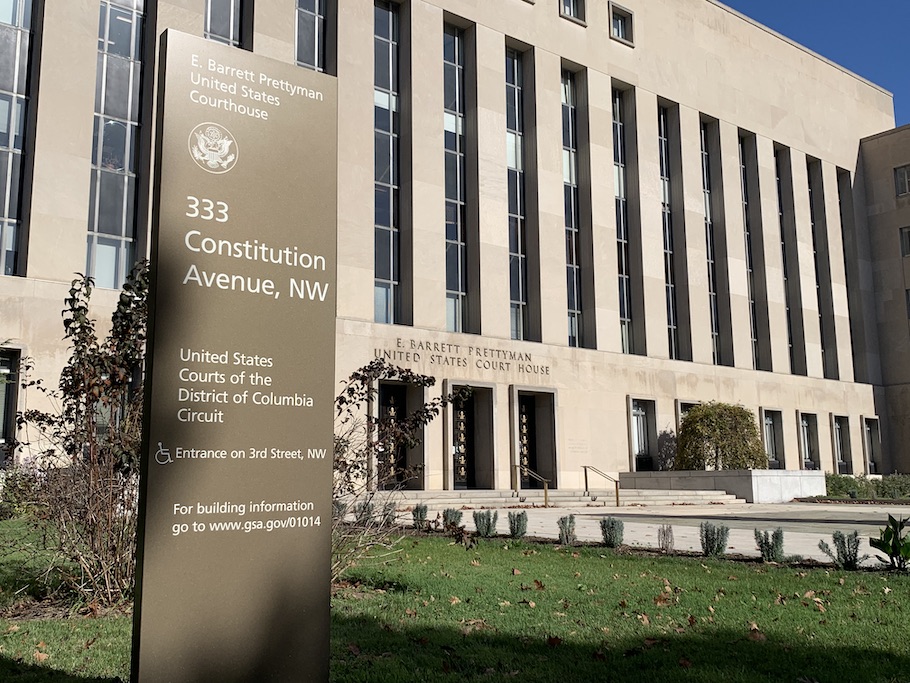
WASHINGTON — Lawyers representing a coalition of anti-nuclear groups’ seeking to block a proposed commercial interim storage facility for spent nuclear fuel faced sharp questioning from a three-judge federal appeals court panel here Thursday.
Thursday’s oral argument session in the D.C. Circuit Court of Appeals provided an opportunity for the interim storage critics, which include groups such as Beyond Nuclear and Don’t Waste Michigan, to state their case against the Nuclear Regulatory Commission’s 2021 decision to license Interim Storage Partners’ (ISP) proposed site in Andrews, Texas.
The petitioners argue the ISP license violated the Nuclear Waste Policy Act (NWPA), which precludes the federal government from building interim storage before a permanent repository is online. The plaintiffs have also contended that NRC unfairly rejected agency-level challenges to the project.
Despite that, the three-member panel of judges appeared skeptical as to the merits of the case.
Judge Florence Pan took particular issue with Beyond Nuclear’s 2018 administrative contention against the proposed ISP site, which argued that the project violated NWPA because of a provision in the license that would allow the Department of Energy to get involved with spent fuel storage and transportation at the facility should the law change.
NRC tossed that argument, saying at the time that the agency agreed it would be illegal to allow DOE to step in on spent fuel transport under current law, and that Beyond Nuclear’s contention didn’t point out a new issue.
Because of NRC’s response, and because Beyond Nuclear never updated its challenge to reflect it, the “central premise” of the group’s contention “fail[s] to raise a genuine dispute about a material issue,” Pan said. Beyond Nuclear “doesn’t acknowledge the alternative” that spent fuel could meanwhile be transported by a private company, thereby avoiding a violation of federal law.
“What we have before us is a contention that was rejected, and apparently properly so on its face,” Pan said. “We don’t have to get into any of these legal arguments about if [interim storage] is legal or not. This contention fails.”
Diane Curran, counsel for Beyond Nuclear, called NRC’s rejection a “catch-22,” arguing that the group had raised a legitimate legal contention under the agency’s rules, and that it was unfair for the NRC to toss it simply because all parties agreed that NWPA would bar DOE from getting involved with the proposed interim storage site.
Judge Gregory Katsas suggested that the court could require NRC to delete the language in the ISP license that Beyond Nuclear said violated NWPA. “There’s no reason why the provision can’t operate as applied to privately-owned waste,” he said.
Curran agreed that such a ruling would be helpful, but not enough, because Beyond Nuclear had “asked NRC not to go ahead with this licensing proceeding in the first place.”
Meanwhile, NRC counsel Andrew Averbach argued the court was “confined” only to rule on whether the agency correctly rejected the plaintiffs’ administrative challenges to the ISP site, not whether it was legally allowed to issue the project a license.
Averbach also defended the language in ISP’s license that opened the door to federal involvement in the event NWPA is updated. NRC’s licensing review addressed “contingencies that may arise” such as a change in federal nuclear waste law, he said.
The license provision was not meant as “a means of granting affirmative authority” to the federal government to start undertaking interim storage activities, Averbach said.
ISP attorney Brad Fagg argued the proposed site’s license “is not and should not be” a challenge to current limitations on the federal government’s authority to store spent nuclear fuel.
The D.C. Circuit Court of Appeals is currently weighing a motion from NRC to dismiss the plaintiffs’ case. As of Friday, the court had yet to issue any ruling.
The proposed ISP site is facing a barrage of legal challenges from a variety of stakeholders. In addition to the joint suit in D.C., the attorneys general of both Texas and New Mexico have filed separate lawsuits against NRC over its decision to license the project.
ISP, a joint venture between Waste Control Specialists and Orano USA, has said that its proposed site could store around 40,000 tons of spent fuel — about half of the country’s total spent fuel inventory of close to 90,000 tons. NRC licensed the facility to operate for 40 years.
The agency is also weighing a license for a similar facility proposed for southeastern New Mexico by nuclear services company Holtec International. NRC has said that it could make a final decision on whether to approve that project by February.